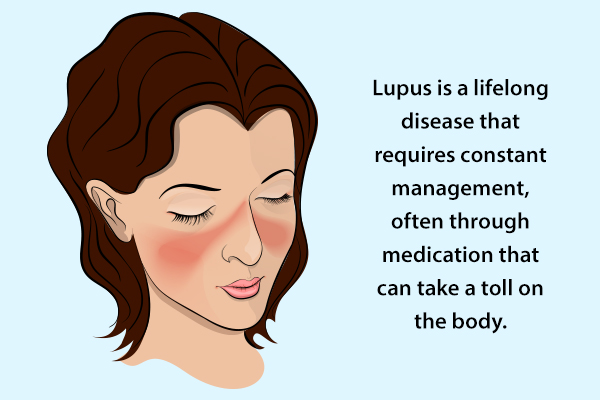In this article:
Danielle Turco, a certified life coach, has lived with lupus for nearly 20 years, and here she talks about how switching to a keto diet helped curb her symptoms and reduce her flare-ups.

Lupus is a lifelong disease that requires constant management, often through medication that can take a toll on the body. But an overall healthy lifestyle, which includes regular physical activity and eating the right foods, can help make it less severe and reduce dependence on medication.
Since lupus is basically triggered by inflammation, a person suffering from this condition must eat foods that do not contribute to the inflammation, and the ketogenic diet is ideal in that regard.
Although there isn’t much scientific evidence attesting to the positive role of the keto diet in managing lupus, Danielle’s positive personal story should inspire people to give it a try.
First Signs of Lupus and Misdiagnosis
During my college years, I was always very tired and achy. My parents were becoming increasingly concerned as I continued to take Advil, sleep whenever I could, and complain that my body hurt. I went to my regular doctor, a rheumatologist, and finally an infectious disease center.
Tons of blood work was done over a 2-year period, and I was given the diagnosis of an Epstein-Barr virus infection and chronic fatigue syndrome. My parents and I were told this came from chickenpox and mononucleosis in earlier years. (1) There was no treatment. Basically, I had to figure out how to live this way for the rest of my life.
I went about my life and never spoke about how I was feeling. I overcompensated by exercising and running races. I spent years hiding my pain from my husband, family, and friends.
Getting the Correct Diagnosis

I became pregnant in December of 2019. At my first OB appointment, routine blood work was taken, and I made my next appointment to go over everything.
In February of 2020, my life changed forever. A few of my test results came back irregular and raised a few red flags. This had to be followed up with more blood work. I was 28 years old and scared to death. After about a week, the new results were in and I was told I have lupus. I had no idea what that was, but my OB assured me I would have a regular pregnancy and not to worry. She was wrong!
As my pregnancy progressed, I became very clumsy, I gained an extreme amount of weight, and my blood pressure continued to rise. My husband and I were becoming increasingly concerned.
Three weeks before my due date, I hadn’t felt the baby move in hours and I went into the office. I had to see an OB I had never seen before. I know she saved my life. I had gained well over 120 pounds, my body was full of fluid, and my blood pressure was at a dangerous level. I was rushed to the hospital to be induced.
After my son was delivered, I began to hemorrhage. They got the bleeding under control, and 2 days later, I was sent home. A few days after that, I got a blood clot in my leg, and this is where my lupus journey really began. I was sent to an amazing rheumatologist and he got to the bottom of all that was going on with me my entire life.
Medication for Lupus
I was told I have lupus and antiphospholipid antibody syndrome (APS). APS is also an autoimmune disease. It causes my blood to clot against itself. (2)(3) This, in conjunction with the lupus, is what made my pregnancy so horrible. I knew nothing about either one of these diseases but swore they would not run my life!
I was put on Plaquenil (hydroxychloroquine) to treat my lupus. (4) I heard its many side effects, but I was hung up on the words, “We have been using this to treat lupus patients. We are not sure if it works. Give it a try.”
My research began. I was not feeling any better or worse while on hydroxychloroquine, and after 6 months, my vision began to decline. (5) I spoke with my rheumatologist and made the decision to come off it and see how it goes.
I have never been on another medication again. I had my daughter in May of 2003. That pregnancy went very well. I was very closely monitored throughout, and I gave myself shots of Lovenox (enoxaparin) twice a day.
For the next 14 years, I suffered terribly from my lupus. I was in agonizing pain every single day, I was tired from sleeping, and just plain life was exhausting. I muddled through refusing to put medications into my body that may or may not work.
Ketogenic Diet to Manage Lupus Symptoms

In September of 2017, I had the mother of all flare-ups. A lot was going on in my life and it all came to a raging stress-induced flare-up. My son was leaving to go to high school in Canada, we were moving towns, my daughter was beginning a new school, and my husband starting a new job. I rallied and got everything done.
Then it hit. I couldn’t walk up my stairs, the pain I felt in my joints was as if they were breaking off, and my hair hurt! I was done.
I began to research “diet and lupus.” From here I found the ketogenic diet. It removes foods from the diet that cause the body to have an inflammatory response. WHAT? This is lupus, the body having an inflammatory response to itself!
I decided this was my next move. I spent a few weeks learning everything I could and preparing my kitchen for this new lifestyle. Within 2 weeks of shifting to a ketogenic lifestyle, I felt amazing. My aches and pains were gone and my energy levels were improving tremendously. Removing all the foods that cause my body to have an inflammatory response was working.
I was living a normal life, something I never thought could happen. I was no longer struggling to get through the errands of my day. Getting out of bed and simply walking to the bathroom to brush my teeth no longer caused me pain.
Someone asking me for plans didn’t cause me anxiety for fear I would have to cancel last minute because my body just couldn’t do it. I was exercising every day and looking forward to living happier and healthier every single day.
After 4 months of changing over to a keto lifestyle, I had my appointment with my rheumatologist. She was floored. I presented well and was full of positivity. She ran a full blood panel and I made an appointment to go over the results in 2 weeks. Less than one week later, she called me because she wanted me to hear the great news as soon as possible. I WAS IN REMISSION!!!!! There were no inflammatory markers in my blood!
I didn’t even know that was a thing. When I asked if this happened because I changed my lifestyle, she replied, “I cannot confirm or deny that since no studies have been done to prove or disprove the ketogenic diet reversing the symptoms of lupus, but if I were you, I wouldn’t change a thing”!
Transition From My Regular Diet to a Keto Diet
I did not have any challenges changing over to a ketogenic lifestyle. For me, I was feeling so great that I was determined to make it work no matter what.
My family did not switch to a keto diet, but the only thing that has changed in my house is that I do not eat the carb I prepare for them and I add extra avocado oil to my vegetables and protein to up the fat content.
Foods That Can Aggravate Lupus

People with lupus should avoid all foods considered inflammatory. These foods are gluten, sugar, rice, nightshades, legumes, fruits high in sugar, and a few other ingredients. (6)
I have found that when I want to cheat with one of these foods, I pay for it almost immediately. My body loves the clean eating, so cheating is not worth it.
Stay Active to Feel Better
I always felt better after a yoga class even when my lupus was active. Moving my body around gently helped with the stiffness I always felt.
I used to use all my energy to take a yoga class because I loved how I felt afterward. I believe mobility, positive activity, and having something you love to look forward to help to make your day a little brighter.
My Advice to Other People With Lupus
This disease is terrible. I totally get that. I suffered for so many years, but I didn’t give up. I researched and fought until I found what worked for me.
I am aware my lupus can come back at any moment. Until then, I will live my life to the fullest and I will keep advocating for all my fellow lupies to find a cure for this terrible disease.
Research everything you can get your hands on. If you find something, ask your doctor. If there is no harm in trying it, go for it! You will never know what might work for you if you (1) don’t know about it and/or (2) don’t try it.
- Was this article helpful?
- YES, THANKS!NOT REALLY


